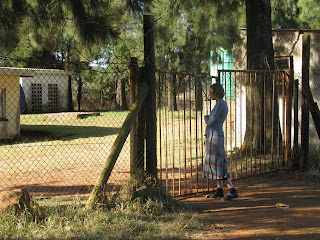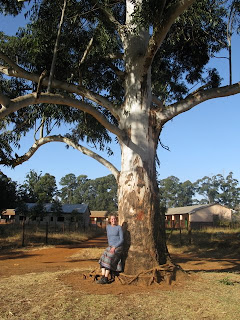 The reason we’re planting in 2 separate gardens is simple: we want a participatory presence in both places. One garden is run by an OVC group (Orphans and Vulnerable Children), and we hope to work with them on various projects. The other garden is the large "bomake," or mothers, garden—a community garden that our own make (pronounced mah-gay) belongs to, along with many others. At both gardens the main challenge is water. Both rely upon open trenches that carry water from a stream 1.5km away, and the trenches are full of sediment and their walls have eroded in a few critical areas (a few rainy season floods). So not much water reaches the garden reservoirs. The bomake garden actually has underground piping to deliver water to spigots in all parts of the garden… but the reservoir that feeds these pipes is all-but dry most of the time. This is an issue that we hope to work on during our time here, and being active members of these gardens marks the beginning of our involvement.
The reason we’re planting in 2 separate gardens is simple: we want a participatory presence in both places. One garden is run by an OVC group (Orphans and Vulnerable Children), and we hope to work with them on various projects. The other garden is the large "bomake," or mothers, garden—a community garden that our own make (pronounced mah-gay) belongs to, along with many others. At both gardens the main challenge is water. Both rely upon open trenches that carry water from a stream 1.5km away, and the trenches are full of sediment and their walls have eroded in a few critical areas (a few rainy season floods). So not much water reaches the garden reservoirs. The bomake garden actually has underground piping to deliver water to spigots in all parts of the garden… but the reservoir that feeds these pipes is all-but dry most of the time. This is an issue that we hope to work on during our time here, and being active members of these gardens marks the beginning of our involvement.When those small reservoirs are dry, everyone must either haul water to their plots by hand or else coax a trickle down the trenches with a shovel or a hoe until enough water gathers in the pit to fill a bucket or two (this second option only applies to the OVC garden). These water difficulties have diminished overall participation in the gardens, thereby keeping affordable and healthy food from many kitchen tables in Zombodze.
 As we have recently witnessed first-hand, there is nothing quite so desperate as a family lacking in food and water. Here, the two necessities seem to go hand-in-hand: without an adequate supply of water, how can one grow food? By comparison, washing clothes or dishes or even bathing in clean water seems a luxury: one bucket bath could water perhaps 5 rows of carrots. I’m thankful that our homestead has the means for its own water tap and well—we never go without water or its benefits. But I think that our work in the gardens will give us some real-life appreciation for what water scarcity means for small-scale food production.
As we have recently witnessed first-hand, there is nothing quite so desperate as a family lacking in food and water. Here, the two necessities seem to go hand-in-hand: without an adequate supply of water, how can one grow food? By comparison, washing clothes or dishes or even bathing in clean water seems a luxury: one bucket bath could water perhaps 5 rows of carrots. I’m thankful that our homestead has the means for its own water tap and well—we never go without water or its benefits. But I think that our work in the gardens will give us some real-life appreciation for what water scarcity means for small-scale food production. As I write this, I keep thinking of the little misters in the produce sections of grocery stores back home. And I cannot help but consider the comparative extravagance of it: our grocery stores continuously water crops after they’re picked, usually with a little thunder-and-rain soundtrack. Why do they do this? Maybe it’s aesthetic-- moist produce does look tastier. Or maybe wet produce doesn’t spoil as quickly… I don’t know. If anyone knows, please tell me. But I was always convinced they did this little misting routine because wet produce weighs more (and therefore sells for more) than dry produce, and the trickery of it always bothered me a little. Now, thinking about it with the Zombodze gardens in mind, it bothers me for other reasons.
As I write this, I keep thinking of the little misters in the produce sections of grocery stores back home. And I cannot help but consider the comparative extravagance of it: our grocery stores continuously water crops after they’re picked, usually with a little thunder-and-rain soundtrack. Why do they do this? Maybe it’s aesthetic-- moist produce does look tastier. Or maybe wet produce doesn’t spoil as quickly… I don’t know. If anyone knows, please tell me. But I was always convinced they did this little misting routine because wet produce weighs more (and therefore sells for more) than dry produce, and the trickery of it always bothered me a little. Now, thinking about it with the Zombodze gardens in mind, it bothers me for other reasons.



4 comments:
Grocery stores spray produce to keep it from drying out (since there are no roots to do that job) which gives it a longer shelf life and makes it look more attractive.
For your irrigation problems, there is an organization called kickstart international that has designed a foot operated irrigation pump specifically for situations like your community's. The main website is kickstart.org, but the page for sales info is http://www.kickstart.org/purchase/index.html I have heard about this organization several times, it definitely appears legitimate. I do not know if this will be practical for your situation, but I thought I would pass along the information. Take care, stay safe, and watch out for dogs!
The vertically challenged men of the produce department have frequently voice disapproval of the term 'little misters.' I think you would do well to reconsider your blog and it's content. Those men do their job, and they do their job well. Please do not compare apples to oranges.
I just got caught up with your adventures. Thanks for keeping us inform. WE miss both of you you in Arizona a lot!
2 weeks ago we went to the wineries in Sonoita, but it was not the same without you guys... BTW we got two cases of wine, inlcuding a case of DC red, just to drawn your absence...
We are very proud of you guys! Now, I have a question about the washing clothe situation. If you have an accident in your underpants, what you suppose to do? Do they have any specific devise for those RARE cases? Like special tongs for picking up the surprises?
I hope to receive an answer soon considering the situation.....
Fed
I have an answer to your question about the "little misters" you have been considering. I admit, I had to do a little research to uncover the answer as I had never thought too long about anything but the soundtrack. I quote from a web site that provided the patent for the invention: "It has been determined that produce that is kept moist will have a longer shelf life and a better appearance than if allowed to dry out. However, the use of misters has to be carefully controlled. Produce that is wet opposed to moist is not appealing and excess water will cause decay of the display cases and surrounding structure and breeds bacteria that is prohibited by code."
So there you have it.
Besos,
Lekha
Post a Comment